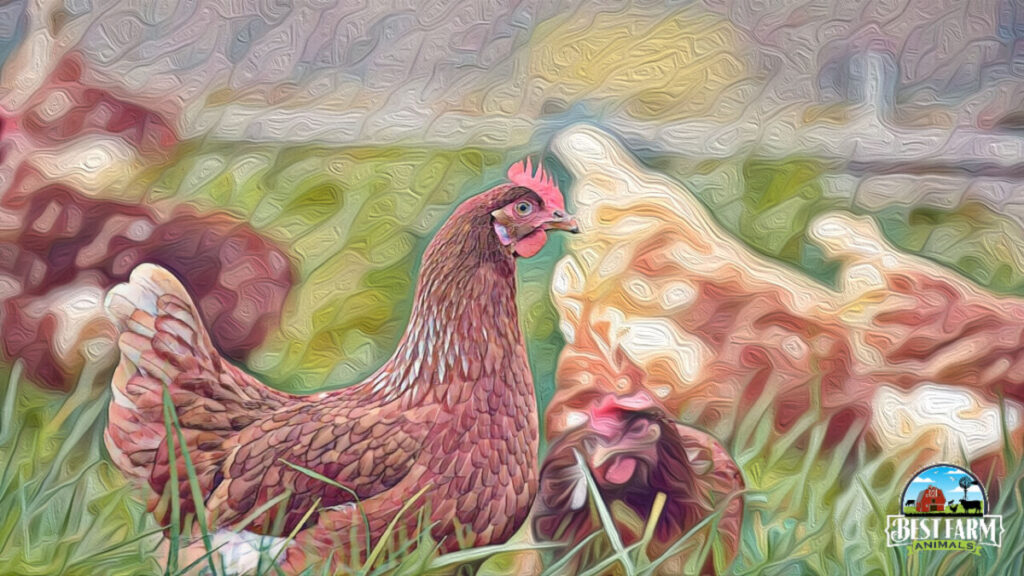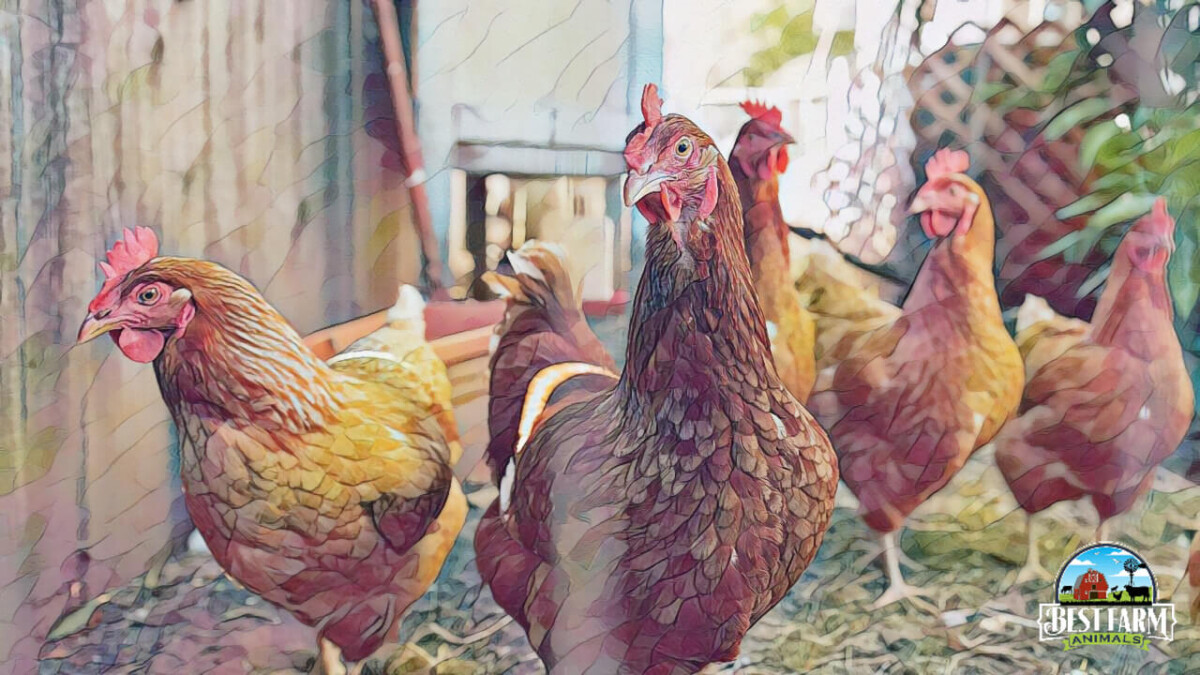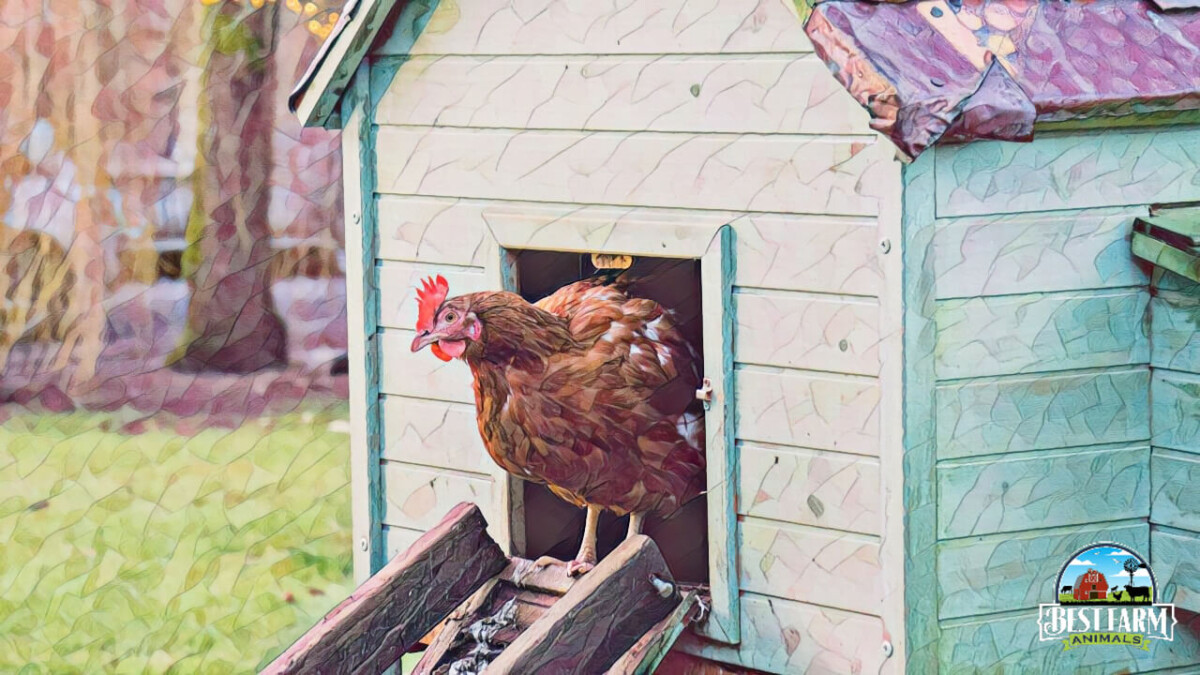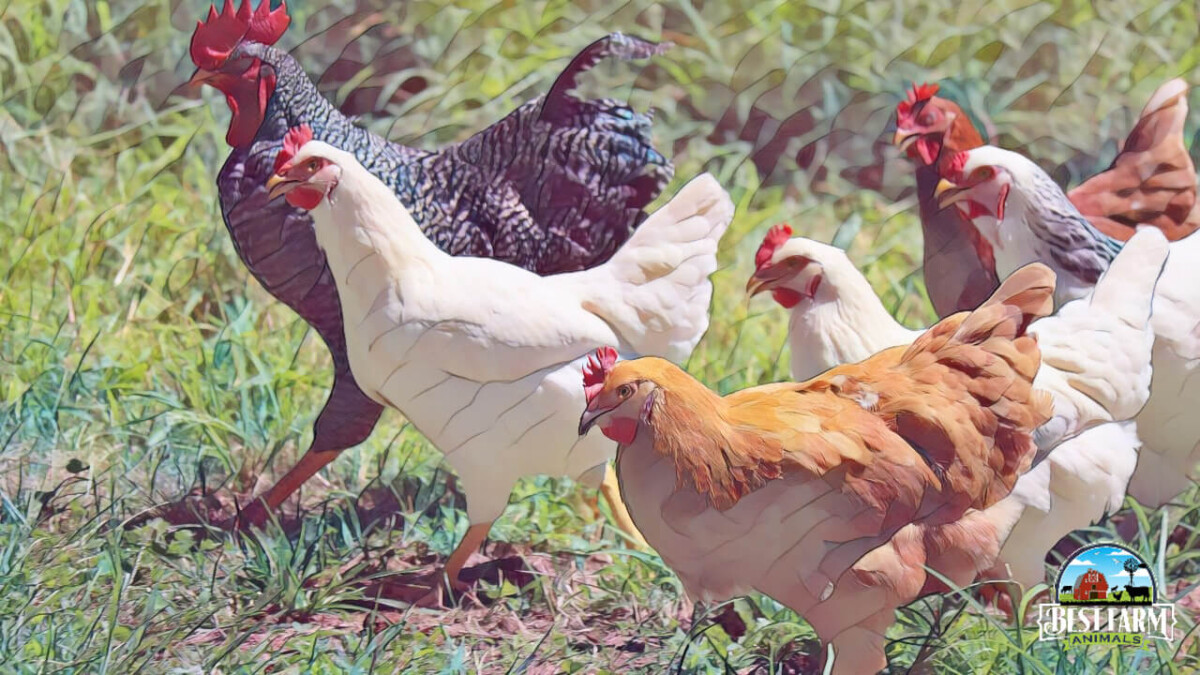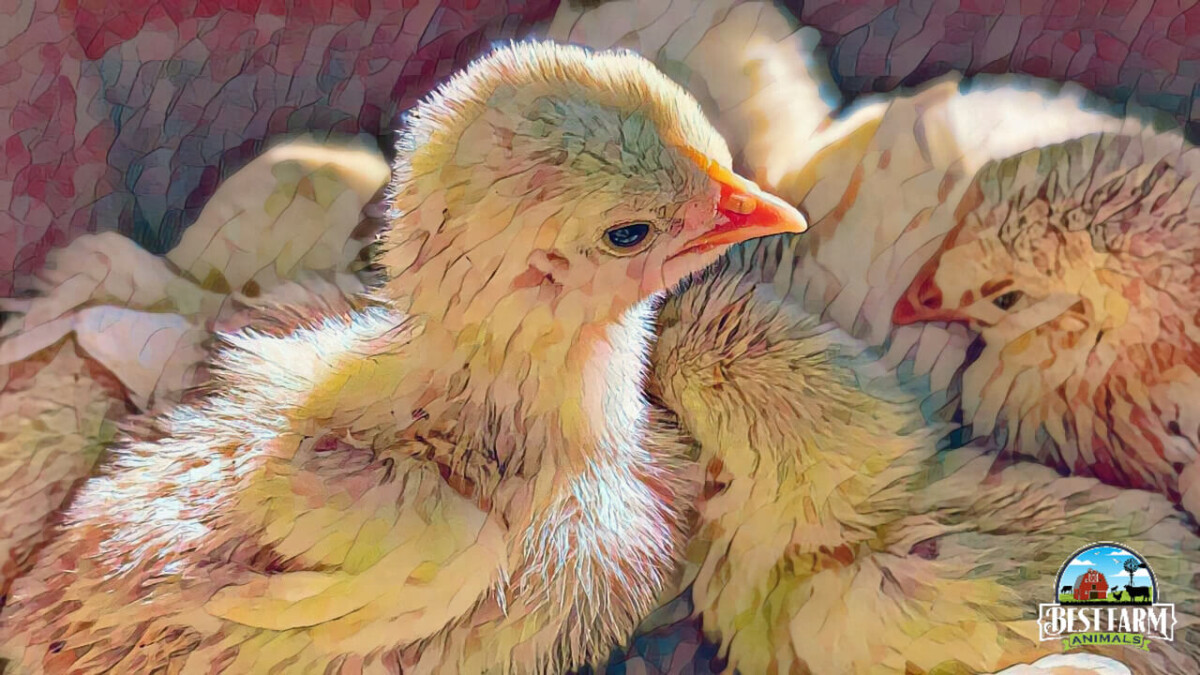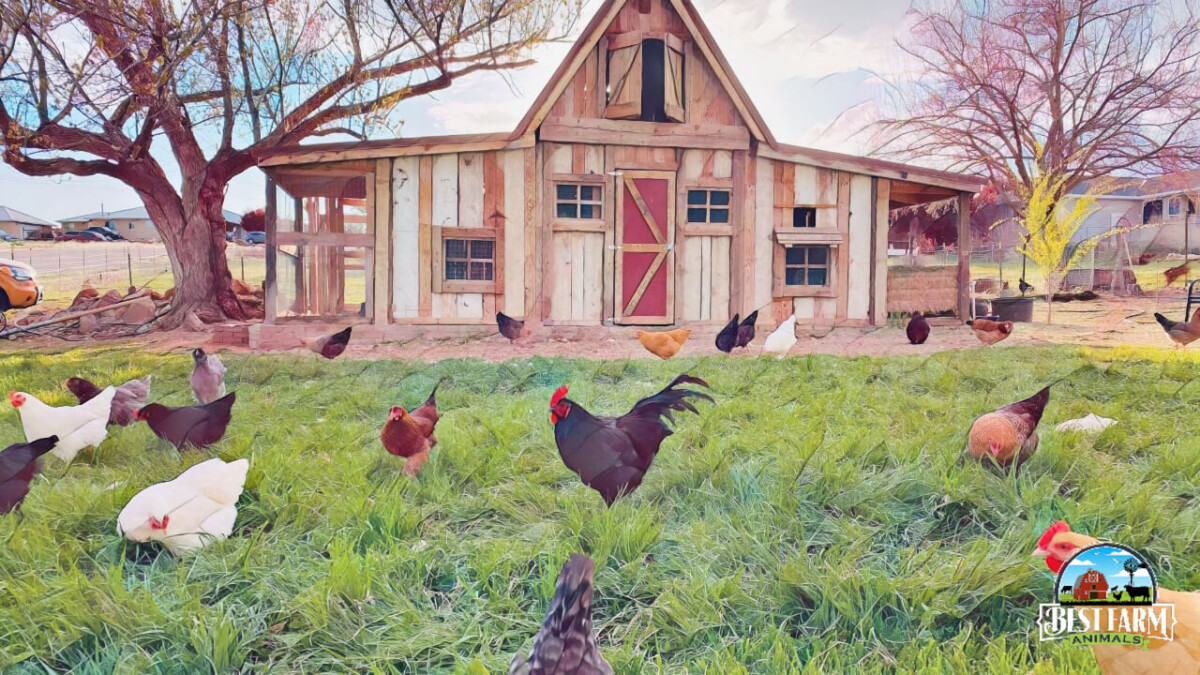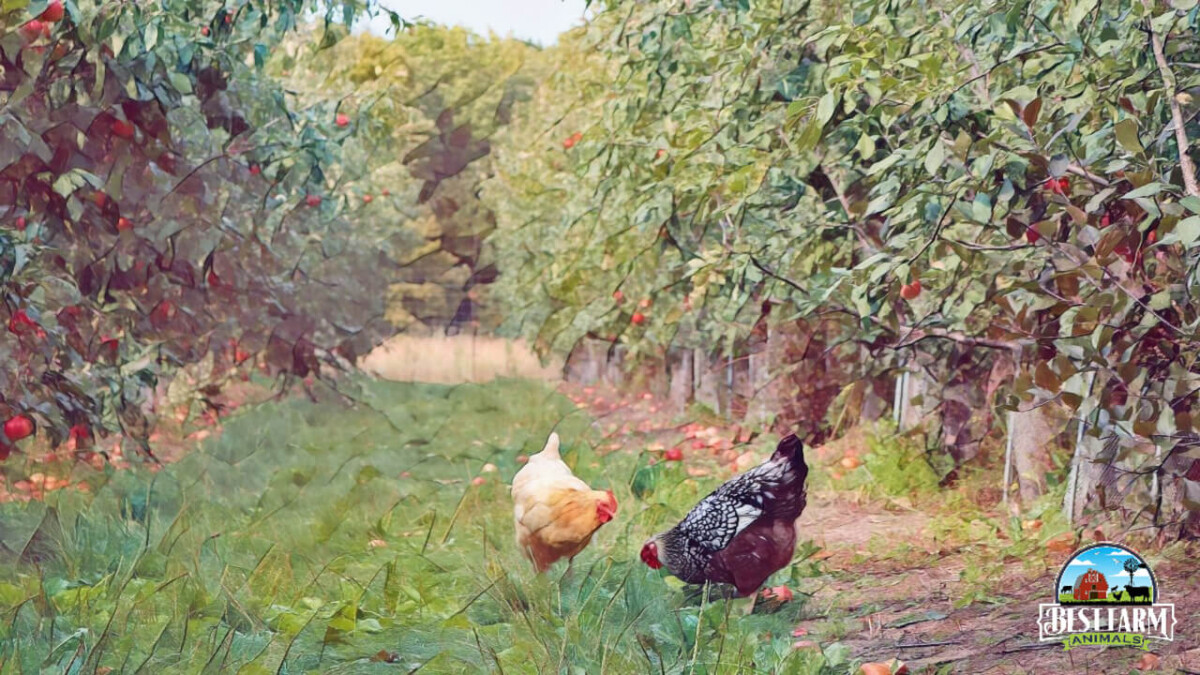I recently got some chickens for our homestead. Since I preferred healthier eggs, I was adamant that my hens would be free-range chickens. I was excited about the idea of happy chickens and healthy eggs (and, of course, the fact that it would be cheaper to have eggs straight from the hens).
At least, that’s what I thought when I started free-ranging my chickens. I researched and ensured my dogs wouldn’t have access to the area where the hens roamed.
Everything went well for the first two weeks, my hens were happy, and soon I collected tasty eggs. Suddenly, I was down to 7 chickens, and my little flock was dwindling. What was I doing wrong? Were they lost? Had a predator moved into the area?
Concerned, I phoned a local chicken farmer for tips on how to keep my hens safe.
How do you free-range chickens and keep them safe the easy way? The easiest way to manage free-range chickens is to use moveable enclosures, which can be relocated to new areas daily. These enclosures will protect the chickens from predators and toxic plants. Other ways to keep your hens safe include providing places to hide, locking the hens up at night, keeping the temporary coops clean, installing motion-activated lighting, collecting eggs daily, putting up electric fencing, getting a rooster, or training a guard dog. Even hanging up unwanted CDs can deter birds of prey.
What Is a Free-Range Chicken?
A “free range” chicken is a chicken that’s able to roam the outdoors freely. According to the USDA (United States Department of Agriculture), a free-range chicken (also known as free-roaming chicken) must have access to the outside to be labeled as such.
It doesn’t matter how much “outside” space the chicken has; as long as they’re not in an enclosure for 24 hours at a time, they’re considered free-range. Big chicken farms simply extend a run and allow the chickens to move away from the coop through little windows or doors.
Several homesteaders and farmers do allow their chickens to free-range. These chickens have access to the outside and are free to roam. Most homesteaders prefer to move their chickens around in temporary enclosures to keep them safe from predators.
The chickens can peck and scratch for food in fields and pastures, giving them a lot of freedom.
Free-ranging chickens are often confused with organic chicken farming. Let’s take a look at the difference between free-ranging chickens and organic chicken farming:
- Free-ranging chickens eat anything they can forage, such as insects, seeds, berries, and vegetation.
- Organically farmed chickens stick to a strict diet of natural, chemical-free feeds. A diet that consists of foraging is not allowed. These chickens mainly eat pure organic feed.
Tips to Keep Your Free-Range Hens Safe
Here are some great tips on how to keep your free-range hens safe (the easy way):
1. Provide Places to Hide
Keep your hens near areas that have dense brush or plant shrubs. Bushes provide an excellent hiding place if a predator comes into the area. You can also purchase portable shelters or plastic tunnels and place them around the area for the hens to hide.
This type of shelter is especially effective when birds of prey try to swoop down on your flock.
2. Lock the Hens up at Night
It’s not advised to leave your hens out at night, as predators can quickly pick them off in the dark. Leave feed and fresh water in the chicken coop, motivating the hens to come home at dusk.
You must remember to lock the hens in at night. If a fox gets into their coop, there will be fatalities, and the surviving hens will be traumatized. If there are any eggs in the coop, the fox will devour them too.
3. Clean the Coop Regularly
Take the opportunity to regularly clean the coop when the hens are out foraging. This will prevent rats from entering the enclosure to eat the hens’ feed and their eggs. If there are rats in your coop, you can be sure that snakes will follow.
A dirty coop spreads viruses and disease amongst the flock.
4. Motion Activated Lighting
Another great tip is installing motion-activated lights on the chicken coop frame. The sudden flood of light will keep most nocturnal predators, such as raccoons, possums, and skunks away.
5. Collect Eggs Daily
One of the biggest frustrations of free-ranging chickens is that the hens hide their eggs. I found the easiest way to locate them was to listen for their “egg alarm.” Chickens squawk before and after they lay an egg.
This will help lead you to their clutch of eggs. Try to collect the eggs daily to avoid predators finding their nests and eating the eggs and the hens.
6. Install Electric Fencing
A great way to keep large predators away from your hens is to erect an electric fence around the perimeter. Electric fences are pretty easy to install and aren’t too expensive, depending on the area you are fencing.
However, I have noticed that small predators such as weasels and snakes can get through the electric fence.
7. Get a Rooster
Putting a rooster with your hens adds extra protection for your flock. A rooster likes to herd the hens and will alert them when a predator is near. Roosters can become aggressive, and they are known to attack predators and even small children.
However, roosters tend to bully hens and can be noisy (especially when they crow in the morning). Noisy behavior is something to consider, especially if you are free-ranging in your backyard.
8. Get a Guard Dog
I prefer to use a guard dog rather than a rooster. You will need to train your dog not to attack the chickens, as dogs are predators. Dogs can move further away from the flock to sniff out predators.
Most predators will stay away if they pick up the scent of a guard dog.
9. Repel Predators with CDs and Windchimes
An effective way to repel birds of prey is to hang old and unwanted CDs or DVDs from branches or old farm equipment. The reflection from the sun on the silver disks will deter the predators. Disco balls are also very effective.
Top Tip: Hanging CDs will keep your hens entertained and mentally stimulated (#discoanyone).
Pros and Cons of Free-Ranging Chickens
Letting your chickens roam free is beneficial for your chickens, as they aren’t cooped up all day. There are, however, pros and cons to free-ranging chickens.
Pros of Free-Ranging Chickens
Here’s a look at some of the pros of free-ranging chickens:
- Better Tasting Eggs
It makes sense that chickens that forage (as nature intended) will have tastier eggs with darker (more orange) yolks. When your chickens forage, they eat things like grubs, crickets, spiders, ticks, seeds, and leaves from different shrubs. This natural food source and their feed (supplied by their owners) are good for producing better-tasting eggs.
Eggs from caged or production line chickens aren’t as rich and tasty as free-range eggs. The lack of taste is because caged hens eat grain which contains fewer antioxidants than a diverse diet found while foraging.
- Natural Pest Control
If you decide to free-range your chickens, you can be sure that almost half of their diet will consist of insects found while foraging and scratching up the ground. This is excellent news for any farmer or homesteader, as chickens do a magic job removing pests in your garden.
Your chickens will gobble up anything from grasshoppers to small snakes.
Did you know: that some farmers will strategically place their free-roam enclosures in areas where they know insect larvae or infestations exist? The chickens eat anything that moves and quickly sort out the pest problem.
So there you have it, a fast, natural, and efficient pest control system.
- Happy Chickens
If you want to see happy chickens, give them the freedom to roam around. Any human, animal, or bird doesn’t enjoy being cooped up all the time. Your chickens are no different. A chicken loves nothing more than to chase after bugs and scratch around in the soil for hours.
They also appreciate the space that free-roaming gives them. When the chickens are in the coop, things can get quite crowded, which leads to fighting amongst the hens. One of the most significant changes you’ll notice (if you consider free-ranging chickens) is there will be no more fights or lazy hens.
Besides the chickens being happier, you might also find it more peaceful to watch chickens forage around and explore their environment.
- Less Money Spent on Feed
Free-ranging your chickens will save you money when it comes to their feed. They will get more food and protein while foraging in your garden or fields. So it makes sense that the more you allow your chickens to free roam, the less you will need to spend on feed.
Your chickens will still need to eat their feed at night in their coop, but this will be significantly less than cooped-up chickens.
Did you know: You can also feed your hens scraps from your table, such as pasta, rice, and beans, as a treat in small quantities).
- Balanced Diet
When your chickens are free-range, they will access food with much more vitamins, minerals, and antioxidants than their usual feed. The chickens will also eat small stones, which will help with digestion.
This diet makes your chickens healthier. Their immune systems can better fight off illness and disease.
A free-range diet also produces healthier chicken meat free from hormones and other chemicals from “factory farming techniques.”
Cons of Free-Ranging Chickens
Here’s a look at some of the cons of free-ranging chickens:
- Hidden Eggs
One of the most significant downsides of free-ranging chickens is that the hens start laying their eggs in hidden places. You must search for their eggs when it’s time to bring the hens in at night.
If you don’t get to them in time, predators such as snakes and foxes will eat them. The loss can become very frustrating, as a hen will return to the same spot each time to lay her eggs. Hens pick places that are comfortable and safe for them.
Following a hen around to find her safe place can be time-consuming, and she might not lead you to her eggs.
- Poop Everywhere
Allowing your chickens to free-roam means that there will be chicken droppings everywhere. If they free-range close to your home, you can expect to find chicken poop on your porch and window sills.
Hens like to perch, and windowsills and verandas make good perching spots. Even though the poop is excellent for your garden (as manure), it can attract flies and get stuck to your shoes and clothing.
Chicken poop also contains pathogens such as E.Coli and Salmonella, which can be transmitted to humans.
- Risk of Predators
One of the main reasons that people steer clear of free-ranging their chickens is because of the risk of predators. There are numerous predators out there that will hunt and kill your chickens, such as:
- Eagles
- Dogs
- Foxes
- Hawks
It’s not uncommon for 30 chickens (for example) to go forage and have only 26 return. Losing chickens to predation may be hard to handle if you’re very attached to your chickens.
- Damage to Gardens
Chickens can turn a beautiful patch of green grass into a dry dust bowl in a matter of days. When your hens move into a new area, they’ll scratch up the ground and devour any seedlings or plants in their path.
There is nothing worse than finding your beautiful flower garden has been scratched to nothing by a flock of hens. It’s difficult to regrow plants once a chicken has scratched the earth. Chickens also love taking dust baths, encouraging them to scratch the ground even more.
- Dead Chickens Everywhere
Unfortunately, if you’re going to do free-ranging, you need to come to terms with the fact that you will lose several hens from your flock. Predators will hunt and kill your hens regularly. Chickens also like to explore and may wander off and be unable to find their way back to the coop.
Chickens are domestic animals, and they’re not able to fend for themselves in the wild. They may end up starving or getting stuck in fencing. If the weather suddenly turns sour and your chickens are busy roaming, they can die from extreme heat or freeze to death in cold conditions (if they don’t make it back to the coop).
Dead chickens attract more predators to the area and can result in a financial loss.
Care Requirements for Free-Ranging Chickens
So you’ve looked at all the pros and cons of free-ranging chickens, and you’re wondering where you should start. Firstly, there are some essential care requirements for free-ranging chickens that you should take into consideration, such as:
- Shelter at night: Even though your chickens are free-ranging, they should sleep in a coop (a barn or garage also works well). The shelter will protect them from the elements and predators.
Ensure to leave the door open for them to come in at dusk, provide an evening meal, and close the door behind them. Predators will try to follow the hens into the coop if the door is open.
- Keep the area safe: Chickens will devour anything, so it’s vital to ensure that the place they roam in has been cleared of toxic plants (such as Bloodroot and Bracken). Be mindful of the type of pesticides and chemicals you use in your yard. When you free-roam chickens, you should avoid using any herbicides or pesticides near the roaming areas.
Some pesticides aren’t necessarily harmful to the chickens, but the chemicals can be carried over into the eggs. Synthetic weed killers and fertilizers can also affect your chickens and their eggs. It’s always best to use organic options.
Put up secure electric fencing around the foraging area to protect your chickens from predators and prevent them from wandering off.
- Supplemental feeding: Your hens need a diet that is high in protein for them to produce good eggs. Although the hens eat many insects and plants during the day as they forage, they still need to eat feed to supplement their diet.
Grit should also be available in their coop to help them digest their food.
Top Tip: Put the feed down before it’s time for the hens to come in at dusk. This will create a good routine for the hens.
- Keep vaccinations up to date: Now that your hens are roaming about, it’s vital to ensure that you keep their vaccinations and deworming up to date. Scratching around and eating insects can expose them to nasty diseases.
Hens are good at keeping clean by having dust baths, but this isn’t enough to control diseases such as Salmonella and avian influenza. Vaccinating your chickens is relatively easy, and there are different methods, such as adding the vaccine to their drinking water, using eye drops, or injecting them.
- Medical care: Unfortunately, it’s common for your hens to get injured while free-ranging. Foot injuries and wing injuries are the most common. It’s vital to monitor your hens and ensure they get medical care when needed.
Open wounds or cuts can become infected and, if left untreated, can be fatal. The smell of blood or sepsis attracts predators.
- General flock care: Ensure your hens have access to fresh water throughout the day. Keep their coop or temporary enclosure clean to prevent flies and mosquitoes which carry disease.
- Mental stimulation: Chickens are curious, and they love mental stimulation. Use old farm equipment or hay bales to create perches for your hens to use and explore. DIY toys like skewers made from chicken-safe food are great for mental stimulation. Treat balls also keep them entertained.
Planting different types of plants that are chicken safe also provide stimulation (such as rosemary and thyme). A lack of stimulation can cause behavioral issues among the flock, such as fighting, feather pulling, and obesity.
- Cover “no-go” areas: If you value your herb garden and veggie patch (and anything you don’t want your chickens to destroy), you will need to fence the gardens off with wire. Chickens love freshly mulched flower beds and will destroy them within hours.
- Spend time with your chickens: Because your hens are free-range, you must interact with them often. Talk to them so they recognize you and won’t become skittish when you approach them.
Chickens are intelligent; you can teach them commands, which they will learn and react to in no time. Many farmers train their chickens to come when called.
Free Ranging Chickens FAQs
How many hours a day should chickens free range?
Most people prefer to free-range their chickens for one to three hours daily. This is enough time for them to forage for insects and seeds, get some good sunshine, and a dust bath.
Can chickens free range in the winter?
Chickens can free-range in the winter. However, they won’t find as many insects and food to eat. It’s best to keep them indoors when the temperature is freezing or below.
Can you keep free-range chickens in your yard?
You can free-range chickens in your yard. You’ll need to fence off herb and veggie gardens, as the hens will destroy them. If you have neighbors, you’ll need to be mindful of any noise or disturbance your chickens may cause. Be mindful of your local bylaws that may prohibit the keeping of chickens in urban areas.
Can chickens survive just free-ranging?
While free-ranging your chickens seem like the most natural way to farm, it’s important to remember that chickens are domesticated animals. Even though they’ll eat plenty of bugs and seeds they find along the way, they still require feed to prevent them from starving.
Conclusion
Free-ranging your chickens is a great way to ensure you have happy, healthy chickens and tasty eggs. However, you’ll need to accept that you will lose several chickens to predators and the elements.
I found that the easiest way to free-range your chickens is to use a “chicken tractor” (a moveable enclosure on wheels). This system gives your hens a new area to forage daily, sunshine, and space.
The best part of this is the peace of mind that predators won’t be able to get to them, and they don’t poop all over your front porch. If you’re wondering which farm animal is best for free ranging around your property without enclosures, read all about child-friendly farm animals as pets.
My Favorite Chicken and Duck Supplies
This list contains affiliate products. Affiliate products do not cost more but helps to support BestFarmAnimals and our goal to provide farm animal owners with accurate and helpful information.
Manna Pro Oyster Shell keeps eggs strong. Before I gave my chickens oyster shell, I had the oddest eggs, many with weak and irregular shells. Now, I don’t have an issue.
Layer Feed by Manna Pro. I like pellets rather than crumbles as my chickens eat them better and less gets wasted or scavenged by rodents. A good layer feed makes the difference in hens laying many more eggs.
My chickens love this mealworm treat, which gives added protein, something that’s great during molting and winter months.
There are many ways to feed and water your chickens. I like this food and water setup the best because it reduces waste, saves me time feeding and watering, and keeps the food fresh longer. Except, in the winter, I use a heated waterer. The only problem is the heated waterers need to be replaced every few years.
I love this chicken veggie hanger. It makes it easy to give your chickens produce from the garden and keep them occupied in the winter with a fresh head of lettuce.
These chicken toys are a hoot! They will help curb bullying and keep your chickens active, especially in the winter when hens tend to get more lethargic.

